[Video] US-China cooperation in an age of strategic competition: Asia Future Summit 2023
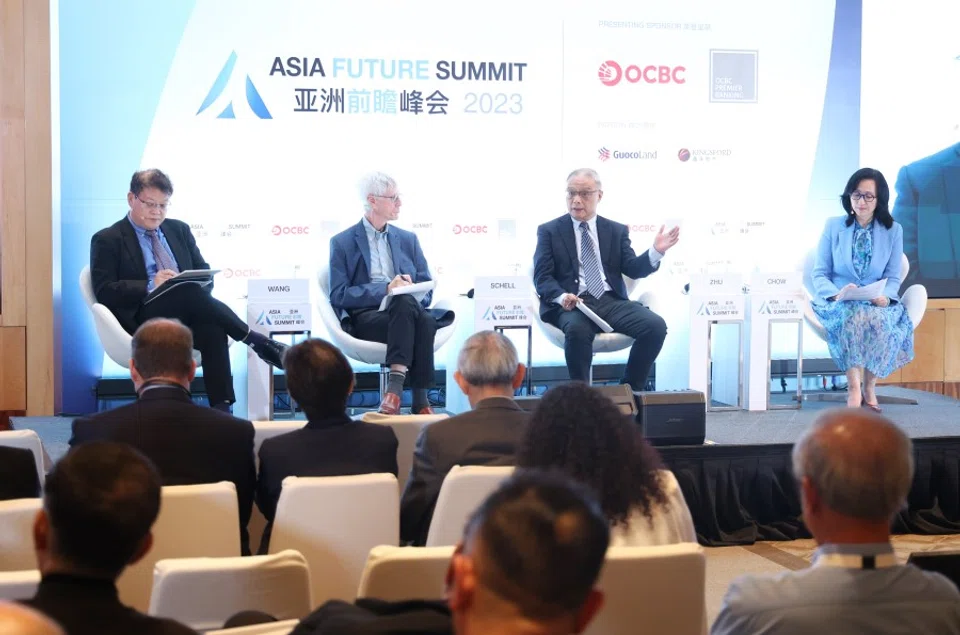
Chow Yian Ping (Chow): Thank you panellists for joining us from around the world. As many of us would agree, China-US tension has worsened over the years, and each country sees the other as the source of the problem. Each is also looking outside the other to form cliques and alliances. Some say we are heading towards real and comprehensive decoupling, even when both economies are still very much intertwined. My question is: how did we get to where we are now? And what are the chances of cooperation, and where are they? Our panel will be sharing their opinion on the topic, and after that we will move on to the Q&A session. May we start with Professor Orville please?
Why did the US's policy of engagement towards China change?
Orville Schell (Schell): Thank you. It's really nice to be here in Singapore, and celebrate your founding leader's 100th birthday. And I think in a certain sense you can say that Singapore represents that best moment in US-China or China-world relations when there still was the promise that countries didn't have to choose sides, which is of course still Singapore's challenge.
I thought it was really interesting this morning... wonderful sessions. But unless I was mistaken, I did not hear the name of Xi Jinping mentioned once. That surprises me. Because I think he is a man who has written himself very large and is critical to our understanding of what is happening and what might happen.
That said, the question that is really very much on my mind, and which I'm very interested to hear my colleagues' reactions and responses, is this - and you alluded to it in a certain sense in your introduction - why did engagement end?
It was an extraordinary period of decades that was initiated, as you all remember, in 1971, 72, when Kissinger and Nixon met with Zhou Enlai and Mao Zedong.
And they didn't know what they were setting in motion, but they were setting in motion this whole era of engagement.
And that era really took off, when, of course Deng Xiaoping came back into power in 1978, the very end, 79, and then in the 80s, and initiated his period of reform and opening. And the supposition I think that everybody sort of adopted was: we could get together.
Things were changing, we wouldn't turn into carbon copies of each other. But we could get along. We had different political systems - ok.
We can trade, we can have cultural relations, we can have academic interactions, civil society interactions. And that initiated a period which many of you have experienced, which is one of the most extraordinary periods of my life - the 1980s. And China sort of did come alive. In fact, a British diplomat wrote a wonderful book about the early 80s late 70s called Coming Alive.
And it was a period of immense hope and immense optimism. I think that any of us who lived through it experienced it and shared. And then of course came 1989 and the Beijing massacre. And that was an immensely tragic moment, and... many of us thought, well, alright, this is the end of that halcyon, very promising period of togetherness.
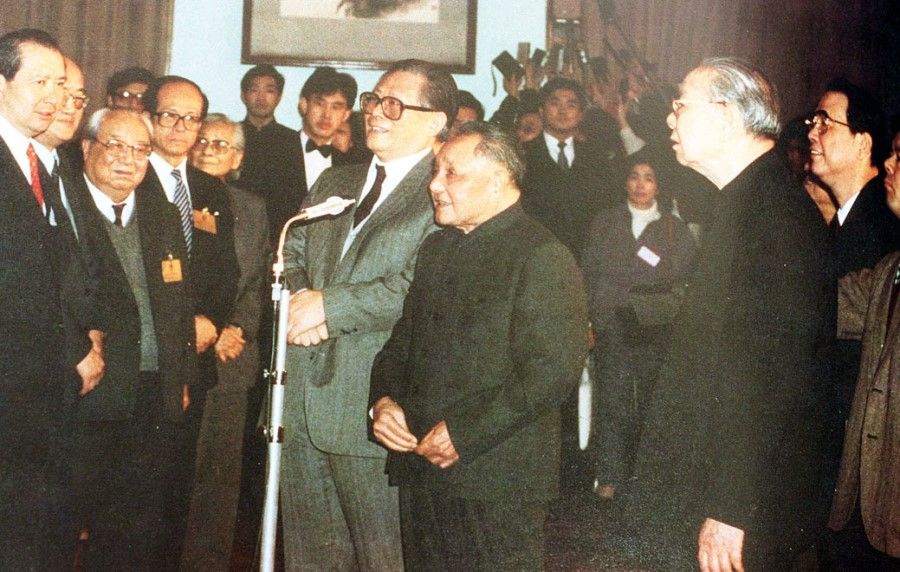
But it turned out that it wasn't that simple. Jiang Zemin, who many of us at the time looked at as being somewhat... a little clownish, to be frank. When you look back on him, you have to say he was quite an extraordinary leader.
Deng Xiaoping was still around for a while, but kept things going, and reform didn't completely die. The Americans and China did get back together again in some rudimentary form.
I've been on many many presidential trips and watched different leaders interact, and I have to say, on that trip, that when Clinton went to China in 1998, it was a very extraordinary interaction between these two leaders because you could see through their body language, through their facial expressions that they enjoyed each other's company.
... many of us felt that history was heading in a direction of greater openness. China wasn't going to become America, and America wasn't going to become China, but it was ok. - Professor Orville Schell, Arthur Ross Director, Center on US-China Relations, Asia Society
And this press conference - I don't know if any of you were there... We were in the Great Hall of the People, and as we were walking into the press conference, it was announced - stunning announcement - that the press conference would be broadcast live over Chinese radio and television all across the country.
And there was a freewheeling press question session. We went into the room where Clinton and Jiang Zemin were to hold forth. And it was an extraordinary time. These two men were laughing; they were sort of enjoying interacting with each other in a very sort of friendly and open way. And that was after 1989. Incredible.
And then, we forged along thinking history had a motion. You remember that moment when... I think many of us felt that history was heading in a direction of greater openness. China wasn't going to become America, and America wasn't going to become China, but it was ok.
... how did a system that was working so well for China, so well for the world, so well for Asia - how did it end, and why did it end? - Schell
And then we ended up with Hu Jintao, who was a kind of unclear-in-concept leader. Not like Hu Yaobang, who's incredibly open and lively and unpredictable. And then Zhao Ziyang, as you all know what happened to him. And it is alright though. Things forged along and President Biden went to China - wasn't the greatest trip that the president had ever been on - but said, you know, "We don't view China's rise as a threat to the national interests of America."
Enter Xi Jinping, China's relations with the world re-catalysed
And then, we come to Xi Jinping. And I don't want to belabour this or get into any great detail, but it was at that moment that this form of leadership in China began to re-catalyse the whole relationship of what went on within China and what went on between China and the world, between China and Singapore, and particularly between China and the United States.
It transformed it. And we might want to talk in some way about what that transformation was about. The question I want to pose to all of you, in closing, is: how did a system that was working so well for China, so well for the world, so well for Asia - how did it end, and why did it end?
Whose interests was it - national interests - to see engagement end? And yet, I'm sorry to tell you, you know it, I don't need to hear it from me, but it is irrevocably gone. It's over. It's dead. And we don't have a new system to replace it.
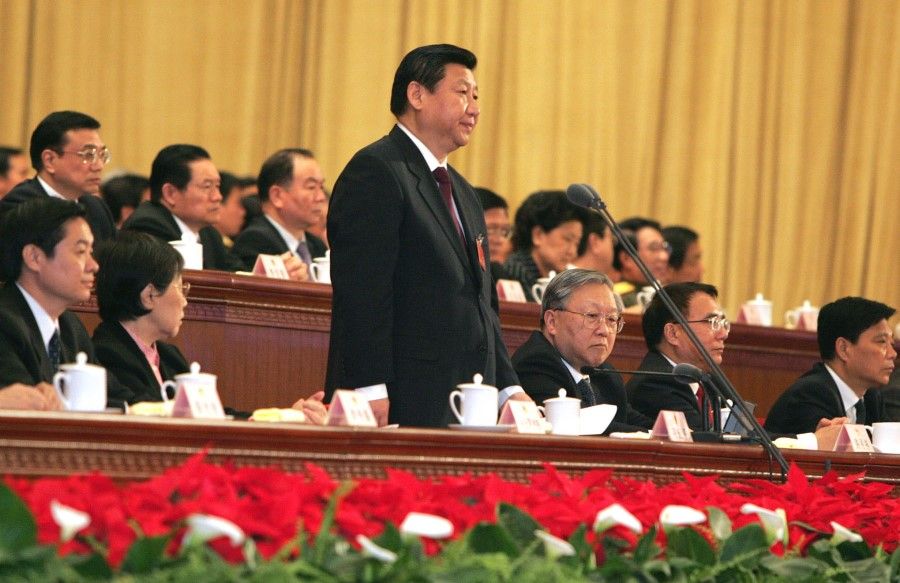
And it seems to me that, if in all the years that I've been looking at China since the late 50s - first went in the mid-70s when Mao was still alive - to me... I look at it as an immense tragedy and an inexplicable tragedy, brought about for reasons which I think you can explain some of it, but not rationally, because it isn't in anybody's interests that it end.
And yet it did. So I'd just like to leave that question out there because I think it lies at the heart of the matter of what our session is about.
... the biggest change in US-China disagreements, especially in the past 20 years or so, is the change in how they perceive each other. - Professor Wang Jiangyu, Director, Centre for Chinese and Comparative Law, City University of Hong Kong
Chow: Alright, thank you Professor Schell. Next, can we have Professor Wang Jiangyu to give your opening remarks. We can come back to the discussion later.
Wang Jiangyu (Wang): Thank you very much for having me. It's a tremendous pleasure to be here and to be with two distinguished international relations and foreign policy scholars. I'm an international lawyer, so it's a bit strange for me to be here, but I do have a big interest in international relations. And it's also a very touching event for me because I lived and worked in Singapore for 17... 16 years, and Lee Kuan Yew was part of my life for the better part of those days. And almost every week we had his image and his voice, and we were inspired by him. So I feel it was a huge shock for me, and I thought we were losing this man in 2016 (Ed's note: Lee Kuan Yew's passing was in 2015) - that was truly a shocking moment.
And I was actually thinking that if Lee Kuan Yew was born and grew up in China, he could be one of the top three greatest leaders, including the emperors, in the whole of Chinese history. Probably among the 唐宗宋祖, 秦皇汉武 (tang zong song zu, qin huang han wu, lit. Emperor Taizong of Tang, Emperor Taizu of Song, Qin Shi Huang, and Emperor Wu of Han - used to refer to eminent rulers). And very likely so. That's why I'm very happy to be here. With all that, now I switch to Chinese... I'm very glad I've been encouraged by the organiser to speak in Chinese, which I feel very comfortable to do.
US-China shift in perceptions dates back to 2008
Wang (translated from Chinese): Thank you very much for inviting me. I would like to approach this question by talking about what we call perception. There is a saying "perception is reality". In my opinion, the biggest change in US-China disagreements, especially in the past 20 years or so, is the change in how they perceive each other. I also think this is a terrifying change because the US and China do not have a history of conflict.
After the establishment of the People's Republic of China, the two incidents that could have sparked differences in opinion among the Chinese people towards the US were the Korean War and the 1919 bombing of the Chinese embassy in Belgrade by NATO.
... so some China officials said things like: "The US was our teacher, but you have now become our student. You are no longer fit to be our teacher." - Wang
But compared to the situation today, those two incidents almost do not count for anything. Because the bad feelings, or so-called hatred, between China and the US generated by those incidents did not last for long. But now, what I have personally observed is a long, sustainable resentment, and not in a good way.
If we were to trace it from a historical angle, I think this shift began around 2008. When the US faced the financial crisis in 2008, we have to admit that China did provide generous help while the US was getting through it.
For instance, China purchased a lot of US debt and its financial institutions injected funds into the US, without going for its own voting rights. In other words, China practically agreed to all of the US's conditions at the time.
However, it was also at that time, because China was now the creditor, and the attitude of a creditor is somewhat arrogant, so some China officials said things like: "The US was our teacher, but you have now become our student. You are no longer fit to be our teacher."
So, these and other remarks from senior officials made the US uncomfortable. This was probably the starting point. Subsequently, I personally feel the report by the Council of Foreign Relations, I think in around 2005 - it was a systematic attack on China, and it also sparked a major reaction in China.
This was a major shift in perception, meaning the US perception of China began to change, and it identified China as a competitor, even an enemy. Then came the trade war. That is a simple historical summary.

In terms of US perception, Prof Schell was very clear on that earlier, and I agree and sympathise on many key points. But in the time that remains, from China's angle, I would like to quickly make two points on China's perception of the US.
... whether they are policy makers, intellectuals or ordinary folk - in fact, most are ordinary folk - feel that the US is a bully. - Wang
First, the reason why I think the future is worrying is because in China there is a collective anti-US sentiment, and it is growing at an unprecedented rate.
We cannot simply criticise it as a nationalistic and unhealthy sentiment. When it gradually becomes a mainstream sentiment, it has to be addressed.
More and more Chinese, from the so-called ruling party to the opposition, whether they are policy makers, intellectuals or ordinary folk - in fact, most are ordinary folk - feel that the US is a bully.
Everything the US does is aimed at bullying us. The US started the trade war, yes? We provided so much assistance to the US during the financial crisis, yet they are not grateful. They launch a trade war against us and sanction our companies without limit.
So even though it has said a lot of nice things, like the rhetoric that Jia Qingguo spoke of this morning, like calling for dialogue, what you do is always aggressive. Right? What you're doing is putting in so many sanctions without loosening up. In terms of actions, it has never done anything friendly towards China. So, more and more people are starting to detest the US, especially ordinary people.
This is what I have observed, this is something unprecedented. Of course, this also has to do with the lead from the government, that is for sure. In the past, the government also took the lead, but the effect was not so strong. That is, many Chinese look at US policies and assess that the US has no good intent towards China. Right? The phrase "no good intent" covers it.
China could do with greater self-reflection
The second point is, within China, there is a serious lack of self-reflection on its own problems. So, first, we think the US is very bad. And second, in China, there is no climate prompting China to reflect on the issues it has.
What kind of issues do we have? For one thing, internationally, since the South China Sea issue arose, many of China's neighbours and other countries have felt that China is starting to become more assertive on the global stage. Getting stronger would mean greater influence, which it has started to use in many areas. And when it uses that influence, it is much tougher than before. This is a fact.
As an observer, I personally feel that in terms of policy, this is the only thing that China has a tough stance on. In other things, actually it cannot be considered tough. But China takes this for granted, not something that it needs to reflect on. Right? No need to reflect. But in fact, it does need to reflect, right? Because you have to reflect on other people's perception of you. And you should reflect.
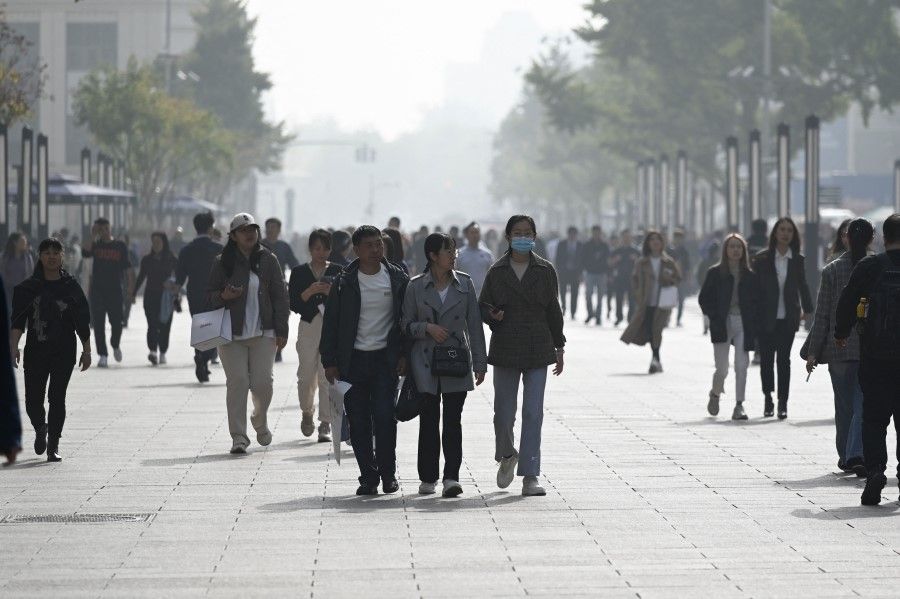
Another thing is really China's domestic policies, which in the past ten years have been tightened a lot. This tightening might be the result of careful deliberation by the leader, yes? He has a plan for the country. What plan? His vision, we don't know. Perhaps it may also be based on his own personal experiences? So it may not be careful deliberation, but based on his personal experiences, he is focused on ideology, right?
With a focus on ideology, politics is everything, yes? And then regulation of expression, no questions asked, right? And then cracking down on certain industries, right? This might be seen as going backwards economically. Of course, perhaps the leader has a long-term plan, right? But we are not sure.
Another thing is, what everyone sees as global populism is strengthening the impression other countries have that China is assertive in diplomacy.
Coupled with domestic tightening, the combined effect is that other countries have the perception of an increasingly isolated China. And this is really happening.
But I think within China, there is not enough debate on this issue. Not enough reflection. So these are my two points on perception: China's perception of the US, and China's lack of self-reflection on some of its own actions.
Chow: Alright. Thank you Prof Wang. Now we will have Prof Zhu to share your opening remarks with us, thanks.
Xi and baby-boomer-generation leaders see great economic progress
Zhu Feng (Zhu): Ok. Thanks for inviting me here. It is my big pleasure. I really enjoyed Dr Schell and Professor Wong's presentation. I want to make some complementary comments.
First of all, I see the deterioration of the China-US relationship as very structural, in terms of international relations theory and historical explanations. The reason is very basic: China becomes a peer competitor to the United States. So then the US takes China as its number one strategic competitor. And this becomes America's policy narrative - because the strategic competitor is definitely equal to your biggest threat, biggest enemy. So then I think that kind of thing is truly happening just because, as I mentioned, of the historically dramatic power redistribution between the US and China.
If in this century there will be one power, which could just come up with the US and then even overtake the US, the only possibility is China. - Professor Zhu Feng, Executive Director, China Centre for Collaborative Studies of the South China Sea, Nanjing University
Back in 1979, China's GDP was less than 4% of America's. Dr Schell mentioned President Clinton's China visit - both leaders truly not just shook hands, but also re-energised our relationship to a new high. So then, the Clinton administration agreed to sign an agreement on China's entry to the WTO, allowing China's entrance. Beijing also simultaneously gets some sort of a special treatment that developing countries get.
Finally, you know, in 1999, both sides eventually successfully reached a bilateral agreement on China's entry into the WTO. This made some sort of historical "economic jumping" of China. Since the reform and opening up back in 1978, China's real economic advancement began with the agreement on China's entry into the WTO back in 1999. From there, the US Western countries opened the market for China's goods, China's productions.
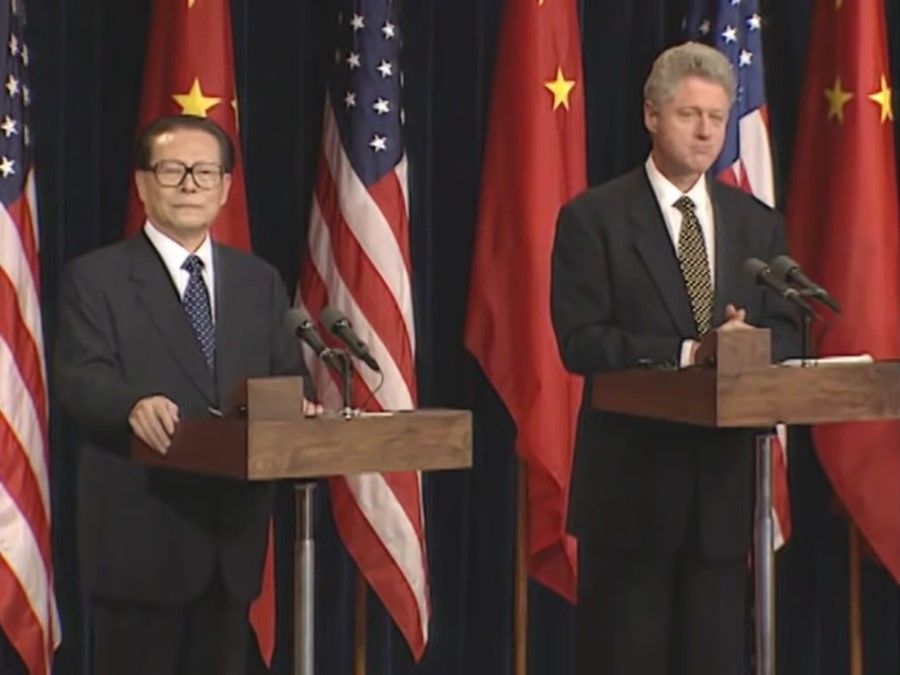
In 1999, China's GDP was just 10% of America's. We were still smaller and weaker. But last year, China's GDP accounted for 70% of America's. So now there are no disagreements in America's policy strategic circles. If in this century there will be one power, which could just come up with the US and then even overtake the US, the only possibility is China. Such a power redistribution, power re-comparison has truly re-cultivated America's China psyche and its China's strategy as well. So therefore, we see that the US has completely changed its China policy and strategy.
...when America's China strategy changed, the US also launched an ideological attack on China. - Zhu
But I think what is happening almost at the same time is also due to a very dramatic China factor. The Xi Jinping administration - they are the first generation of Chinese leadership out of the baby boomers since the end of the Second World War. So that kind of China leadership really witnessed the entirety of China's dramatic change.
They consider that China did a great job. Not just bringing China from some sort of a poor country over to some sort of, we say 小康社会 (xiao kang she hui, a moderately prosperous society). On the other hand, China also gets the biggest portion of the people out of poverty. That kind of China peace, world contribution, it should just deserve some sort of appraisal and appreciation.
Demonisation of Chinese government by the US
But the real contrasting reaction from the US is: when America's China strategy changed, the US also launched an ideological attack on China. So demonisation of the Chinese government and the Chinese internal and external relations and behaviour also become a central piece of America's current China approach. Then it also triggered Beijing's counter-attack.
So then we see China consider that it should raise some sort of renewed idea on how international governance could proceed. So Beijing also repeatedly set out some sort of China ideas, from the Global Security Initiative to Global Civilisation Initiative. So then that's also a reflection of some sort of China's deepened frustration. In the meantime, there is some sort of China's new enthusiasm in standing up vis-a-vis the United States.
China's still weak. The US still takes the lead in overall national might. - Zhu
My second point I have to say is no matter how the Chinese feel uncomfortable about America's dramatic change of China policy and strategies, there's no way China could just fall into some sort of fracture or even just full confrontation with the US.
On the one hand, China's still weak. The US still takes the lead in overall national might. Chinese traditional philosophy is very interesting. We would rather not fight with a bigger and stronger potential enemy. If we do not have a big chance to win. That's why Beijing remains low-profile. We should go back to our traditional Chinese philosophy. I mean, we need to know how to 以弱胜强 (yi ruo sheng qiang, to win from a position of weakness), 以柔克刚 (yi rou ke gang, use softness to conquer strength).
So from this point, I think yes, no matter how China's domestic emotions vis-a-vis the US is getting poisonous and even confrontational, but on a policy circle, we're still very expectedly consistent. We refuse to let there be any military and security diplomatic showdown with our American counterpart. We should completely reject any great power seduction of tumbling into some sort of overall confrontation. So even on the Taiwan issue, there is a lot of speculation. Probably it could become some sort of explosive point. To be honest, no, I don't think so.
China should take sobering medicine and stay the course
Final points. I think yes, on the one hand, the US just takes China as the biggest strategic competitor. There's no way China can escape from that. So therefore, we also have to reconfigure China's policy and strategy. So I think, like Jiangyu also made the point, when a great power re-emerges, it is not a glory, it's a risk. So Beijing shall keep its mind sober enough. Otherwise, unmanageable conflict and confrontation with the US will be very disastrous for China's historical re-emergence. So China's diplomatic pragmatism remains very expected.
I think it's also reflecting China's leading components of the strategic culture. China will not be like Putin of Russia. China will not be like Stalin of the Soviet Union. We should recognise how big the risk is when the US does a complete about-face on China. So most important is: let's get 1.4 billion Chinese people to still have a better life in the coming decades. It's the only important strategic target. I think the entire Chinese society should reformulate the consensus on this.
So from these points, I think yes, on the one hand, from the Chinese government to the ordinary Chinese people, there are anti-Americans, some sort of sentiment is just really rising up. But on the other hand, I hope the deterioration of our relationship is a sobering medicine. And China would pay more attention to our diplomacy and the domestic economic strategy.
So from these points, I really hope, you know, today's world, and with the global issues unbelievably just sweeping through every corner of the earth, probably there is only one choice: US and China competing but we should also be sticking with each other. On the one hand, even if we are in some sort of conflict, on the other hand, we should still keep the interdependence. Almost in all the corners. And again, US-China relations moving forward in some sort of competitive but manageable manner. Thank you.
Chow: Thank you Professor Zhu. I think our panellists are coming from rather different perspectives. Professor Orville focuses on the leadership under President Xi Jinping. And I think Professor Wang you mentioned US containment efforts against China, and also this Chinese lack of reflection on certain of its actions, and also the leadership's tightening of control. Whereas Professor Zhu Feng, you've talked about the containment efforts by the West led by the US, reactions to a rising China. Would you like to respond to what the other panellists have just shared?
Triggering US containment
Schell: There're so many interesting questions here, I hardly know where to begin. But let me begin with the question of American containment of China. Let me also remind you that nine American presidential administrations wholeheartedly supported engagement. And I think that a really interesting question that we might want to try to analyse a little is the question I began with: why did it end? Because containment came out of the end of engagement, after engagement ended. Then people began to get a little bit alarmed, a little bit threatened, a little bit feeling somewhat fearful that... you mentioned China becoming more assertive. Some people even described it as belligerent. And I think it was that change which triggered the old impulse within America - and now within Europe to some extent too - for containment.
... was it necessary for China to completely antagonise Canada? Australia? India? Korea? Japan? And now maybe the Philippines? Why is that in China's interests? - Schell
But it wasn't something that just jumped up out of nowhere. It was something that was a response to China's own actions. At least that's how I view it. Now it doesn't mean the United States is a perfect country and doesn't do anything wrong; that's not true. But I think that it's really important, if we're going to try to find a solution to this, to understand where the impulse to reassert a kind of containment policy comes from.
Let me just ask you two another question: was it necessary for China to completely antagonise Canada? Australia? India? Korea? Japan? And now maybe the Philippines? Why is that in China's interests? They weren't resisting China's rise. They didn't see China as a hostile power. They saw China, they were content to see China rise and to profit by that rise and trade. So I think these things need to be a little more critically analysed. You can't just say, oh well, both sides made mistakes. Of course that's true. But you have to look at what's the animating impulse. What began this downward slide that we're all now trying to wrestle with? And figure out how to remedy it. What should America have done that it didn't do?
So the perceived radical change in Chinese foreign policy, was it kind of a natural progression, sort of roughly around 2012? Or was it because of a leadership change? - Wang
Chow: Professor Schell, do you have an answer to that?
Schell: Well I... I would rather hear my colleagues answer it because my answers are... I'm sick of my answers. I know my answers. I want to hear some new answers.
Personality versus policy
Wang: I can only respond with one question to both Professor Schell and Professor Zhu. So the perceived radical change in Chinese foreign policy, was it kind of a natural progression, sort of roughly around 2012? Or was it because of a leadership change? So leadership change in this regime determines everything. It's also a puzzle to me, why there was such a sudden change in both actual actions and international perceptions.
And also a very quick response to... I prefer that it was very personal. Because look at the China-Australia debacle, right? The very short trajectory of China-Australia relations. I think it was about three years ago. China was very angry with Australia and because of the AUKUS, and also because China believed that Australia was whole-heartedly following the American policy to contain China, so using a not-very-polite...
Schell: No, they asked for a... investigation of the Wuhan virus. That's what triggered it.
Wang: Yes, but quite interesting. Australia's position hasn't changed. So Australia still has the same position, but very recently, China decided to improve its relations with Australia. So it was also a puzzle to me. So Australia hasn't changed. And nobody would say that Australia would withdraw the request, or that Australia would not follow the Americans and decide to withdraw from AUKUS. But China seems to have decided to soothe relations, right? To improve relations with Australia. So it's all a top-down process. I don't think you can come up with a rational answer for that.
Schell: Well that... that may be a truth worth pondering.
Chow: Professor Zhu Feng?
Zhu (translated from Chinese): I think Dr Schell brought up a very interesting question. I will answer in Chinese, perhaps to make it clearer how the Chinese think.
This is indeed... how should I put it? You mentioned China's wolf warrior diplomacy towards South Korea, Japan and Australia.
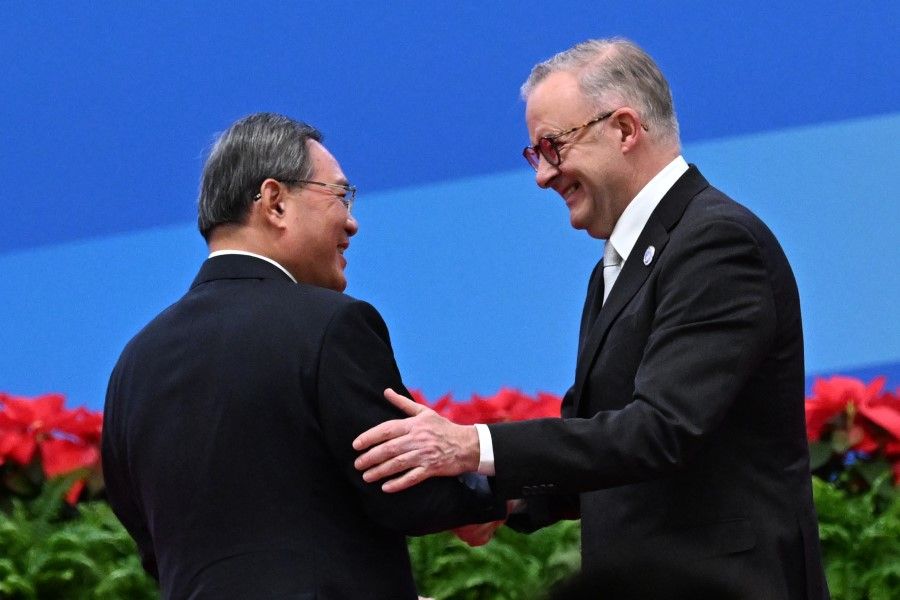
I think that does, to a large extent, represent the current style of diplomacy of the Chinese government today.
... China's current leader has character. So he would also want to express his displeasure. - Zhu
This is because on the one hand, China is already the second largest economy in the world. On the other hand, we feel that look, the US not only does not respect China, you have demonised China's rise and tried to contain it with your many allies. So what is China to do? Should China keep quiet, swallow its displeasure and pretend to keep a low profile? There is no question, China's current leader has character.
So he would also want to express his displeasure. But I personally feel this is not how Chinese diplomacy usually is. Because normally diplomacy focuses on direct communication, interaction and dialogue to form new consensus. So, I feel that we cannot equate the wolf warrior diplomacy in the past few years to current and future Chinese diplomacy.
However, I feel that this is precisely what marks the complexities of today's Sino-US relations. China will no longer be kept down by the US. Insult or bully China, and we pretend to keep quiet - that era is over. From this angle, the future of Sino-US interactions would not only have to reflect their respective interests and concerns, but we would also need a more in-depth, balanced and reasonable analysis of each other's policy characteristics, leaders' personalities and domestic political factors.
The last point is, Dr Schell also mentioned how the current US policy on China is not one of deterrence. There is no doubt the US policy towards China today is not the deterrence policy it used during the Cold War with the Soviet Union. During the Cold War, the US and Soviet Union had no economic dealings, so the most important deterrent measure during the Cold War was military, geostrategic and all-out blockade confrontation.
But today, the US wants to bring the new Cold War to China, so the new deterrence policy is a core part of that. It is a war of technology, trade, digitalisation, market and ideology, of which we feel the tech war completely contravenes the WTO principles of a free market and fair and open competition. But I don't think this isn't a new Cold War or new deterrence policy. The current tech war the US has launched against China is the most tangible and dynamic manifestation of a new Cold War.
Will war break out over the Taiwan Strait?
Chow: Thank you Prof for your comments. We can address some of these issues raised in the Q&A session later. Before we open the discussion to the floor, please allow me to ask a question about the Taiwan Strait. The Taiwan issue is often seen as a dangerous flashpoint in China-US rivalry. Many China observers have also weighed in about a possible war in the Taiwan Strait and the circumstances under which such a confrontation will occur. I want to ask, what is your view about this? Do you believe the US military will be directly involved on the battlefield? And what do you think is the best way to avoid this scenario? Do you think the current situation of maintaining the status quo in the Taiwan Strait is actually sustainable?
Schell: Well, you want me to start?
Chow: Yes, sure. Professor.
People in Taiwan do not want to be part of the Chinese mainland. So you can't just say, "I'll give it to China." One of the most august and confirmed principles of the United Nations Charter is "self-determination". - Schell
Schell: This is pretty much at the heart of the matter. I would say the Taiwan Strait, in your field (looking to Prof Zhu), South China Sea, is critically important. When President Nixon was talking with Chairman Mao, and they're trying to figure out what to do about Taiwan, you may recall what Mao said. He said, what does it matter if it takes a hundred years to solve Taiwan? Let's not let that get in the way. Then you may recall that when Deng Xiaoping went to the United States to normalise relations with the US, he stopped in Tokyo. And he was asked about Taiwan. He said, "Let's leave it for smarter generations to come to solve that." Not Xi Jinping's version of "it's gonna be solved sooner rather than later", but "let's just not worry about it now. Evolution may take care of it. There's a natural interest that will tie the two together, and we will deal with it then." Now what was wrong with that as a solution?
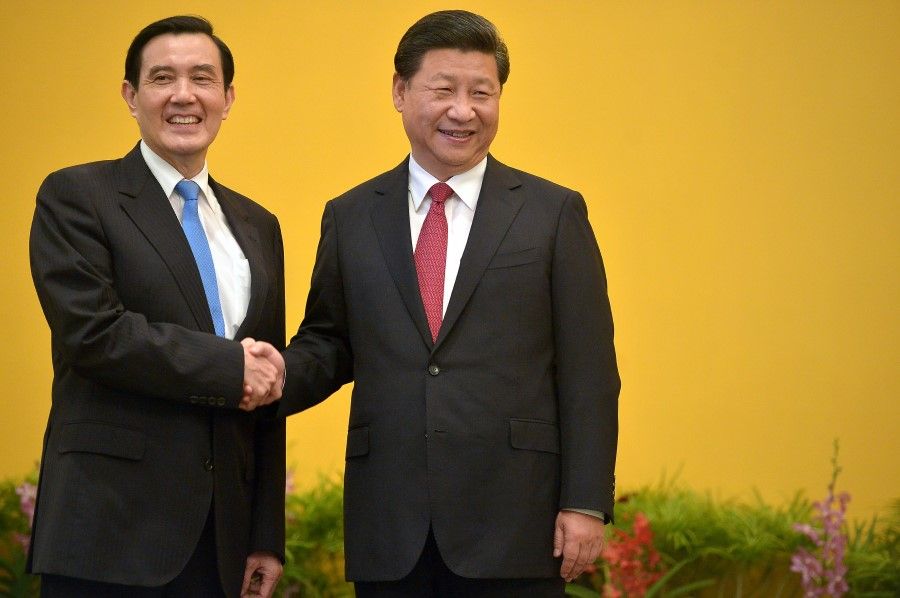
I think the problem is that at one point, Ma Ying Jeou came here, met with Xi Jinping. That was a good move! That's Singapore at its best! And then, the sabre-rattling started across the Taiwan Strait, and it did condition the attitude of the people on Taiwan to make it... and then Tai... and then Hong Kong... got enveloped by China, and this transformed the political chemistry in Taiwan. You have to acknowledge that. People in Taiwan do not want to be part of the Chinese mainland. So you can't just say, "I'll give it to China." One of the most august and confirmed principles of the United Nations Charter is "self-determination".
If China believes there is a need, they will definitely stop at nothing. - Wang
So... you know, again, it seems to me we were on a good trajectory with Taiwan at one point. We were trading. Foxconn was there; hundreds of thousands of employees. Apple was there. It was all ok. It's when it began to be...getting... to say that we can't wait, and that we have the right to militarily occupy and take Taiwan, that just scared everybody in Taiwan away from wanting to be part of the Chinese mainland and made the thing impossible. At least that's my view. And I think, again, it's an enormous tragedy because we were on the way to mending this thing. And we destroyed that hope. We destroyed that scenario. And I was recently in Taiwan - I started studying Chinese in Taiwan when I couldn't go to the mainland. I felt like I was back 50 years ago in the world in which I began trying to understand China, and asking myself, "Why?". And I haven't heard an answer yet.
Chow: Do you see a war erupting over the Taiwan Strait?
Schell: I'm very pessimistic because I think leaders with thin skin and 面子的问题 (mian zi wen ti, lit. problem with/of "face") - they get painted into corners, or they have to act. It's very dangerous. And I fear that that could be what happens with China and Xi Jinping. He feels that he's being humiliated. And you remember: China is a culture of grievance, of humiliation and of anger against hostile foreign forces outside. And it could precipitate in very dangerous and... actions. It could tip the world over in a heartbeat. I fear that; I'm not predicting it.
Chow: Right. Professor Wang?
Wang: Professor Zhu first?
Zhu: 你来 (ni lai, "you go first").
Wang: I can't speculate whether the American military will get involved on Taiwan. I can make three quick points in Chinese.
No imperative to 'take back Taiwan' in the short term
Wang (translated from Chinese): First, I have no doubt that Taiwan is the core interest of China's core interests. The Chinese government and leadership have said more than once, published various white papers, and have in place the anti-secession law to reiterate that China will stop at nothing to defend or take back Taiwan. I take the "will stop at nothing" literally - China will definitely do that. This is because, for a country, there are some things you cannot give up. Why did the US join the first and second World War? I don't think China is talking big. If China believes there is a need, they will definitely stop at nothing. That's the first point.
Second, as an observer, I don't think there's an urgent need for China to seek reunification with Taiwan immediately, whether by peaceful or military means. I don't even think there's a need in the foreseeable future. A huge difficulty would be governance, a technical issue once Taiwan is reunified. How do you govern? To govern 23 million people, you'll need to deploy a force of at least one million. Where would you get them? That would be creating major trouble for yourself. And then the Taiwanese love to protest, right? They like taking to the streets. They see the government as a servant, and take that for granted. So even if the reunification were to succeed, and the Taiwanese take to the streets every day to scold the Chinese government or the Chinese Communist Party, that would be a cost he would not want. So, there is no imperative need to take back Taiwan. I don't think the talked-about 2027 or 2030 is going to happen. It is not possible.
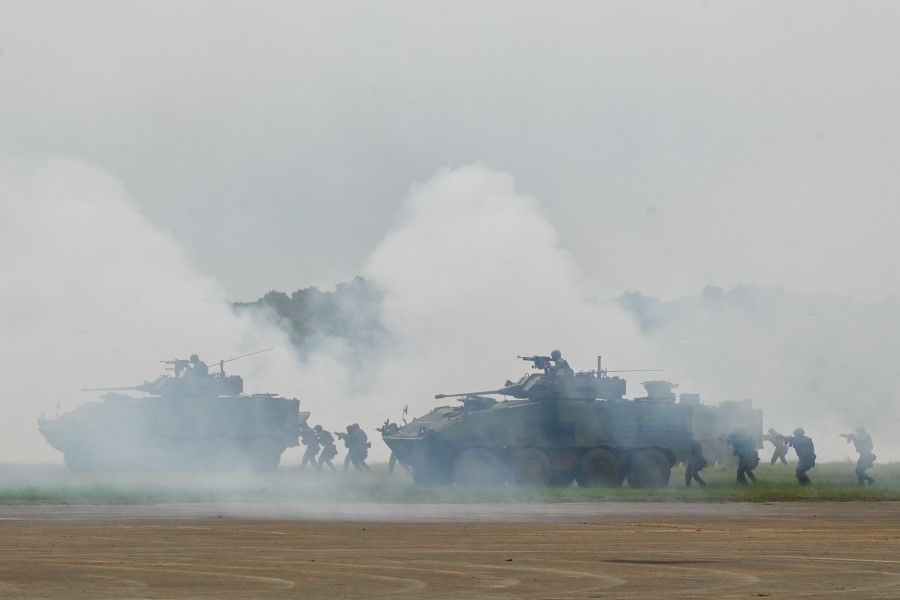
Third, realistically speaking, while some say that Taiwan is America's pawn against China, it can also become China's pawn. Meaning, even though China has no pressing need to take back Taiwan, but if China feels that... I hold a similar view to Prof Zhu, in that the Chinese feel that the US has ill intentions towards China, right? So if one day after you restrict this and that, everything is restricted - no sales of chips, complete restrictions, not just some companies, but everything... As Dr Schell correctly pointed out, China is a country that has suffered for more than a century, and it is worried about foreign bullying and interference. The Opium War happened, the Eight-nation Alliance happened. If that happened in the past, why can't it happen in the future? Right? If the US were to bully and attack China one day, Taiwan would also be a card China could play, right? And if China plays that card, the US would be in an awkward position, right? Of course, this is an extreme conjecture. Those are my three points.
US imposing a 'Silicon Curtain' on the Taiwan Strait
Zhu (translated from Chinese): I would like to add two points on the Taiwan issue. First, most importantly, we have to see that from the Trump administration to the Biden administration, the US's China policy and Taiwan policy has changed. This is a key reason why the Taiwan issue has become so challenging and severe. The US used to agree to the "one China" policy. The only legitimate Chinese government is that of the People's Republic of China. But what is the US's Taiwan policy today?
If you read how Antony Blinken and President Biden speak of the US Taiwan policy, the Americans are clear - what Taiwan issue? The Taiwan issue is the US and Western democracies joining to defend the human rights and freedom of the 23 million people of Taiwan. How is China to accept that? The Taiwan issue is an issue of human rights and freedom, no longer a territorial issue for China. This is why Beijing sends planes to circle above Taiwan. It has become our only card. How can we stop the collusion between the US and Taiwan? That is really what's causing the divide. Now, China can only play this so-called military deterrence card.
We cannot allow the Taiwan issue to become a so-called Asian Ukraine problem to sanction and suppress China. This is completely not in China's interests. - Zhu
But on the other hand, the complexity of the Taiwan issue today reflects a new characteristic of Sino-US relations in a strategic competitive era. The US doesn't mention this, but US academics are clear: the rising tensions on the Taiwan issue and between Taiwan and China are a result of the US trying to impose a Silicon Curtain on the Taiwan Strait. We know of the Iron Curtain during the Cold War, so why a Silicon Curtain now? As I mentioned previously, the core characteristic of the new Cold War is a tech war. And Taiwan's TSMC is a key company manufacturing high-end chips and semiconductors globally, making Taiwan an important representative high-tech manufacturing and supplier base. So the higher the tensions in the Taiwan Strait, the higher the chances of conflict, and thus the higher the TSMC output volume flowing to the US. Do you know how much TSMC has invested in the US in the past two years? Four factories, US$28 billion.
I'll be frank, the Taiwan issue is a lot more complex today than it was previously. For mainland China, the most important thing in the Taiwan issue is that we cannot allow ourselves to be held ransom by the US. We cannot allow the Taiwan issue to become a so-called Asian Ukraine problem to sanction and suppress China. This is completely not in China's interests.
Schell: Might I make a little proposal in the follow up of the question? Is it conceivable that at some point the Chinese leader might say, first, Taiwan is ours. Everybody agrees... has agreed that... nobody is really disputing that. Second, as we develop, as we become more open, hopefully, as we become more comfortable, we will have to have discussions with Taiwan about the proper time and way to fold Taiwan into the larger Chinese proposition. Now, why isn't that a good way to go? What's the hurry? Here, I think sadly is where ideology enters. If China wants to be a one party Leninist state, and it expects Taiwan to accept that in Taiwan, I think it's gonna be impossible. And I think we could have war.
Wang: Yea.
Schell: If China were to say, and this was the virtue of reform, things are changing. You know? And at one point, we were at that moment where things were changing and Taiwan was... hundreds of thousands of Taiwanese were going to the mainland to work. Happy, friendly. Companies were piling in, investment was piling in. Why did that end? I think I know the answer, but I'd like to hear it from you two.
Chow: I think Prof Schell is suggesting that on the US side, you were saying that, you know, Taiwan can wait and China can wait. And also, Prof Wang also suggests that actually, the Chinese are willing to wait, but now the Chinese are not trusting the US enough, or not trusting the whole situation enough to wait. So they are showing that... yea.
Wang: Yes, I think you're right, My own observation is I think China has never declared that it will take over Taiwan immediately or in the foreseeable future. But I fully agree with what Professor Jia Qingguo alluded to this morning. It depends on two things: number one, what Taiwan does. Right? You have a group of people in Taiwan who are so desperate to pursue independence, right? Or in the...
Schell (interjects): I don't get that feeling.
Wang: ... either in the legal way or actual independence. De facto... de jure or de facto independence. And also it also depends on to what extent the US treats Taiwan. So the Chinese belief now is: the US is using Taiwan as a card against China! Right? So you are using Taiwan. Without the US behind it, Taiwan wouldn't be so assertive in terms of pushing forward for independence. So this is the Chinese reading of the story. It might be misreading, but it may be true. And the American reading of China is: China is going to take over Taiwan by 2027! Right? That is also misreading. So we have a... misreadings here!
Chow: Alright, so I think on the Taiwan issue we can just go on and on and on.
Schell: That is true.
Question and Answer session
Chow: We only have 15 minutes left, and we want to invite questions from the floor. So please tell us your name, where you are from, and who you're directing the question to. And try to keep your question short, and also just ask one question. You can also ask the question online, but I think we'll just open to the floor. So if you'll raise your hands... and you can direct your question to... yes please. Ambassador Chan?
Ambassador Chan Heng Chee*: I'm not speaking as Ambassador Chan, Orville, I'm speaking as a political scientist to a political scientist, and Professor Jia is a political scientist, and I'm sure Zhu Feng you are a political scientist too.
On your question "What happened?", you know... you were... moving in engagement and suddenly changed. Nine presidents of the United States previously pursued a path of engagement. I think China was then a very different China. It was poor, it was backward, it was not a threat to the United States. The United States now is a very different United States also. You've changed a lot to today's United States. At one point, it seems to me that Americans suddenly woke up and saw that China had gained a military strength, critical military strength, and political power, technology power, economic power, to become your peer competitor. I think I heard it was you know, somebody at Asia Society, I thought it was Steve Schwarzman, I thought the year was around 2017, suddenly you felt it. And that was when America, you know... awakened to the fact. It was also during President Trump's administration. So there was no going back after that. This is a peer competitor, and you've got to deal with it.
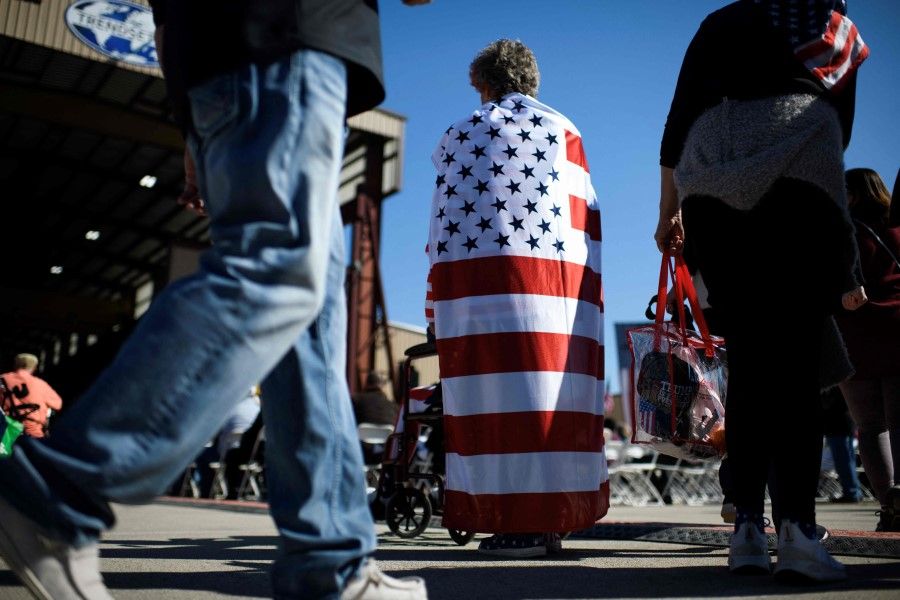
Now, the question I have for you, and maybe the other speakers would also... Professor Wang and Professor Zhu would like to comment on this. In the United States... you've said, "Why can't you get on?" Is the United States only able to coexist with a non-communist regime? Government? You cannot work with a communist government? That's my question. I thought you could. You worked out some coexistence with the Soviet Union. So what is it different this time?
And I come back to what has happened differently in the United States. And what has happened differently in China today. You are polarised in the United States. You... people see things in extremes. You know? So is there a nuanced view of China possible? I think America today overdraws China. You know, China has made many mistakes, and China is not an angel. For Southeast Asians, you know, we look at the South China Sea and we see problems, alright? So China is not an angel to us. But, you know, nonetheless, many of us think the portrait the US has of China is overdrawn. Now, the question is whether China overdraws the image of America now. So, you know, can you find a solution out of that? And the question: can America today live with a communist regime?
But China's rise alone? I think we were... I mean, we were both... we were supporting that. Repeatedly said we did not see China's rise as a threat to our national well-being. - Schell
Schell: Well, I'll give you a quick answer, Heng Chee. I mean, I think that the heart of the matter is in your question. I would say yes. Because we did it for almost three decades. We lived relatively peacefully and tranquilly with a communist regime. I think what transformed the equation of our relations was not China's rise alone, which is unsettling and obviously causes some people concern. What really threw it off the tracks was the belligerence, the aggressiveness, the sort of challenging attitude which many many countries have now experienced around the world. And I think those two things were fatal. But China's rise alone? I think we were... I mean, we were both... we were supporting that. Repeatedly said we did not see China's rise as a threat to our national well-being.
Chow: Professor Wang or Zhu Feng, do you want to respond?
Wang: Yea, you go first.
Zhu (translated from Chinese): Ok, thank you Ambassador Chan. I think you asked an excellent question.
Why do I think Sino-US relations are bad? Chinese experts on the US have been asking the US this for many years. As I mentioned in the ASEAN dialogue session at the ISEAS-Yusof Ishak Institute a couple of days ago, the most important positive international factor that allowed for China's strong economic development from 1978 to 2018 was the US. The Chinese people have to admit that. So I believe in this Chinese creed. We know that the Chinese believe in differentiating grievances and favours. We have to thank the US as we should for helping us. When I was a student at Peking University in the 1980s, our international relations and politics professors were Professor Robert Scalapino and Professor Tang Tsou, both visiting US scholars. I learnt a lot about international relations from them. But I also see this very simply - the essence of relations between powers is never-ending competition for power. As such, the US's about-face on China is normal, because the US sees maintaining its position as the only global superpower to be of great national interest.
But why did the US do an about-face on China? There is a second reason: America sees itself as an exceptional leader. Mainstream American society is completely unprepared to accept the current rise of a strong China. So, the US's ideological perception of China has never changed - China is a communist country.
We have done alright, we have grown and contributed to the world for so many years, so why can't the US show China even the most basic understanding and respect? - Zhu
From this perspective, this is also why the Chinese government has been a bit volatile in its responses with its US policy. The fundamental reason is this: the current generation of leaders faces strong inner turmoil. We have done alright, we have grown and contributed to the world for so many years, so why can't the US show China even the most basic understanding and respect? That's a strong response, no?
So from this perspective, I feel that Ambassador Chan's question is very important. No matter what, Sino-US interactions must move towards that which is manageable, that is competitive and cooperative, with peaceful coexistence. Both sides have to be mindful not to overdraw the other's image. The US presidential elections are next year, which we are worried about. Election season is when China becomes a prime target. So as Jiangyu mentioned, we are also concerned about nationalist sentiment within China, anti-US sentiment. These are key domestic factors that we need to influence and manage domestically. Thank you Ambassador.
Chow: You have another... . Can we have the mic please?
Paul Haenle**: Thank you. Paul Haenle from Carnegie China. I want to pick up where Ambassador Chan left the panel this morning with Jon Huntsman and Professor Jia Qingguo when she talked about the hope the region has that Xi Jinping and President Biden can meet at APEC in San Francisco and have a meeting there. I'm not clear whether that's going to happen or not, if I read the signals that's coming out of China. One Ministry of State Security social media site said that they're not satisfied with the US approach, which is containment, and engagement - old wine in a new bottle. And that the US side would need to show sincerity in order for President Xi to be able to travel.
So I would like to try to understand better what that means. To show sincerity? In what form? Or what of the US has as many grievances I suspect as... as China has in terms of the relationship. Does the US need China to show that it's sincere for the meeting to happen? And if so, in what form? And then if we can make the meeting happen, what would be success from the Chinese side? We've got to be realistic I think. It's not going to change the general trajectory of the intensifying competition and antagonism in the relationship, but we should be able to do some good things. So from the Chinese standpoint, what would a good outcome be? And from a US perspective, what would a good outcome be?
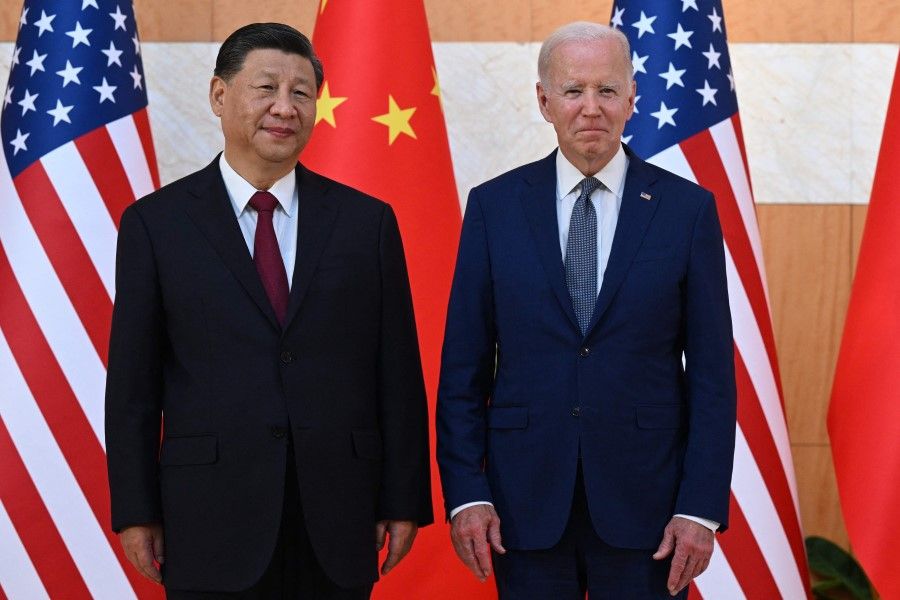
Schell: Yea Paul, you know, one of my worries about this... I went to the last APEC meeting, it was held in America in Seattle with President Clinton, and there were huge demonstrations in the street, even against Jiang Zemin. I worry that if President Xi does come to San Francisco, he will take umbrage at the free expression, which certainly is going to fill the streets of San Francisco. Now that aside, do I think it's worth meeting? Yes, I do. I think it's always... diplomacy is the only other tool we have. The question is what could each... what could Biden and Xi each give by way of sort of... constituting a new form of relationship? I'm not sure it's very clear.
And reading the Chinese newspaper, we see how stupid those nationalist comments are. And reading American newspapers, you see how hypocritical it is. How hypocritical and how biased it is. - Wang
Wang: Very quickly, to Professor Chan's question. As a person who grew up in China and studied and lived in the US for a number of years, you know, it gets frustrating and angry every day because I do have the habit of reading both Chinese and American newspapers. And reading the Chinese newspaper, we see how stupid those nationalist comments are. And reading American newspapers, you see how hypocritical it is. How hypocritical and how biased it is. You know, you get really really angry every day, very frustrated. So that's solid evidence that both countries are overdrawing each other, demonising each other. And this is what worries me the most.
And very quickly to Haenle, your question.There are two explanations. One is personal. That is, after all, it is one man's decision. Because nobody knew why President Xi didn't go to the G20. Right? There are no explanations. And a number of other occasions. So it is personal... so it's totally up to one person. And when it comes to one person's decision, you can never predict. And the second explanation is... what... Professor Schell alluded to. The Chinese perspective or one Chinese perspective might be: it's meaningless to have a meeting between the two leaders because the Chinese understanding is the United States didn't deliver anything, right? After the Bali Conference. So nothing has been fulfilled, why would we want to see each other again? Right? So you might have reasons to... for domestic political purpose right? To control the conflict. But we didn't have such a need. Right? We don't have such a need, so it makes no sense to meet you. So this is... both are my guess. Right? Nobody knows.
Chow: Prof Zhu?
Zhu (translated from Chinese): It is very likely the Chinese and US leaders will meet at the APEC Summit in November in what would be the second in-person heads of state summit since Biden took office. We know that high-level dialogue between both sides resumed when Blinken visited Beijing in June. The question is how to move things a step further? Since Nixon's visit to China in 1972, the stability of Sino-US relations could be maintained via an important channel: head-of-state diplomacy. So what opened the door to Sino-US relations back then was Nixon's sudden visit to Beijing. And after the June Fourth incident of 1989, it was head-of-state diplomacy that played a key role in bringing the relationship through multiple challenges in the 1990s. So I feel that no matter how complicated Sino-US relations get, we should go back to past experiences and allow foreign diplomacy via our heads of state to lead the way forward. This is an important political legacy in picking up Sino-US relations again.
Secondly, how do we advance dialogue mechanisms while also taking into consideration the complexities of our respective domestic politics? There is one common factor for China and the US in handling bilateral relations: it is a tough diplomatic security policy issue, and a tough, dangerous domestic political issue. In other words, the emotional factors on both sides are huge. So I feel that we should let head-of-state diplomacy play its irreplaceable role in coordinating, mobilising and pushing things in a reasonable direction. So, I am looking forward to the second in-person summit between the Chinese and US leaders in November.
Chow: Due to time constraints, we are actually at the end of our Q&A session even though we only have two questions from the floor. Could we have our panellists round off this session please? Are you optimistic or pessimistic about US-China relations?
... if China and Xi Jinping really were smart, they would recognise that Biden does want to make a deal. He is the best flight out. Get on board. Because you know what's coming after him? We don't know. And it might be a lot worse. - Schell
Zhu: Neither optimistic nor pessimistic. So we should have a very normally and reasonable expectation for bilateral relations. No illusion for the moment. No... we say some sort of unrealistic, you know, expectation at all. But we still need enthusiasm and even strategic connections because US-China, US relations absolutely the most important and most complicated relations in the world.
Schell: 我觉得你说得很对 (wo jue de ni shuo de hen dui, I think you are very right). But I think also... if China and Xi Jinping really were smart, they would recognise that Biden does want to make a deal. He is the best flight out. Get on board. Because you know what's coming after him? We don't know. And it might be a lot worse. This is a guy who knows Xi Jinping better than any world leader because they spent more time together. My god, if they can't sit down and say, "Listen, the world is at a... at a critical point here. It's in your interests, it's in my interests, it's in the world's interests to settle something." If they can't do that, well, I guess I'm just gonna be outright pessimistic.
... history is often made by accidents, not necessarily by choice. - Wang
Zhu: Great, I agree.
Wang: Politically correct answer is "I'm optimistic", and honest answer is "I don't know." It really depends on what these two countries do in the future, especially in the next ten years, because history is often made by accidents, not necessarily by choice. So it really depends on what happens.
Chow: Well thank you panellists. you have been wonderful, and we surely want to remain hopeful. Thank you.
Panel: Thank you.
Chow: Thank you everyone. Thank you.
*Ambassador Chan Heng Chee, ambassador-at-large with Singapore's Ministry of Foreign Affairs
**Paul Haenle, Maurice R. Greenberg Director's Chair at the Carnegie Endowment for International Peace and visiting senior research fellow at the East Asian Institute, National University of Singapore
